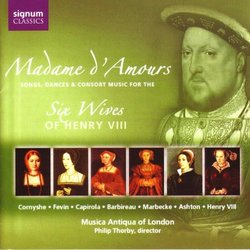| All Artists: Francisco de la Torre, William Cornysh, English Anonymous, Matthieu de Gascongne, Antoine de Fevin, Italian Anonymous, King of England Henry VIII, Vincenzo Capirola, Jacques Barbireau, Scottish Anonymous, John Merbecke, Hugh Aston, Musica Antiqua London, Jennie Cassidy Title: Madame d'Amours: Songs, Dances & Consort Music for the Six Wives of Henry VIII Members Wishing: 1 Total Copies: 0 Label: Signum UK Release Date: 3/29/2005 Album Type: Import Genres: Dance & Electronic, Special Interest, Pop, Classical Styles: Vocal Pop, Opera & Classical Vocal, Chamber Music, Historical Periods, Early Music Number of Discs: 1 SwapaCD Credits: 1 UPC: 635212004425 |
Search - Francisco de la Torre, William Cornysh, English Anonymous :: Madame d'Amours: Songs, Dances & Consort Music for the Six Wives of Henry VIII
CD Details |
CD Reviews2* Scholarship; 3* Performances Maddy Evil | London, UK | 08/11/2005 (3 out of 5 stars) "This CD, which focuses on music from the court of Henry VIII (1509-47), is divided into 6 sections, each one corresponding to one of his 6 wives. The concept is both original and interesting, but unfortunately, it is inevitably problematic because most of the music with a direct connection to Henry's wives is either not known or has not survived (for example, the 'newe balads' sung by the 'qwyre' at Anne Boleyn's coronation in 1533 [Withington, 'English Pagaentry', i, 184]). Furthermore, the impracticality of such a programme is merely exacerbated by Philip Thorby's selection of music, which in many cases is unconvincing, and at times suggests a misunderstanding of both the musical sources and the function of music at Henry's court.
Firstly, the tracks taken from 'Henry VIII's MS' (c.1510-20) can only be connected with any degree of certainty to Catherine of Aragon (r.1509-33). Thus, for example, Cornyshe's 'Blow thi horne' (track 6) - presented here under Anne Boleyn (r.1533-6) - is clearly more convincing in the context of a court disguising like that celebrating the birth of the 'New Year's Boy' in 1511, where "the pageant rested before the Quene [Catherine], the forenamed forsters blew their hornes, then the deuise or pageant opened..." (Edward Halle). Similarly, in the Jane Seymour (r.1536-7) section, Henry VIII's "compositions" - 'Gentil Prince' and 'En vray amour' (tracks 11 + 12), erroneously credited here as "anon", contradicting HVIII's MS - are much better seen alongside Foreign Ambassadors' reports from early in Henry's reign, praising the King's musicianship (e.g. Giustinian, 1515, etc). Certainly, 'Adew Madame' (track 24) is a most unlikely choice for Katherine Howard to have sung with her music tutor, Henry Mannox (with whom she had an affair in 1536), for several reasons: (a) as confirmed by 'Henry VIII's MS' (from which it is taken), this song is by the King himself (it is NOT "anon"!), yet neither Katherine nor Henry Mannox were in inner court circles at that time (n.b. she became Queen in 1540), (b) the song was over 20 years old by then, and (c) it is in French, whereas her only known correspondance is in English. Thorby also grossly exaggerates the importance of Mannox in Katherine Howard's downfall, the main reason for which was actually her infidelity with Dereham and Culpeper. Other selections are equally implausible. In the Jane Seymour (r.1536-7) section, for example, Capirola's ricercar (track 15), published in Venice in 1517, links to the 'Duke of Somersett's dompe' (track 16) which, although based on Capirola's 'Padoana belissima' (1517), is actually a transcription from a manuscript postdating Jane Seymour's death (BL Royal MSS App. 58, c.1540). Similarly, in the Katherine Howard (r.1540-2) section, Henry VIII's 'Time to pas' (track 20) - yet another incorrect attribution here to "anon"...!! - is from a court play of c.1517 entitled 'The Four Elements'. Yet the prize for the most unsuccessful section on the disc surely goes to that for Anna of Cleves (r.1540): it comprises 3 pieces which are hopelessly archaic for 1540, and not one of them can be plausibly connected to her - Barbireau's (d.1491) 'Een vroulyk' (already waning in popularity by the time of it's inclusion in HVIII's MS, c.1510-20), the anon 'Danse de Cleves' (from a manuscript belonging to Margaret of Austria [B-Br9085, c.1499-1501], who is only tenuously connected to Anna) and 'Ainxi bon Youre' (no valid connection to Anna, and from a source [Trento, Castello del Buon Consiglio. MSS87] dating from c.1475...!!). Thorby's reasoning for this selection of pieces - namely Anna's 'provincial tastes' - is ill founded; a) she was unmusical, and (b) she is described enjoying dancing with Katherine Howard in 1541 (LP, XV, p.493) - surely not to music 40-65 years old...?!?! The performances themselves are mostly solid and some of the interpretations are attractive, such as 'Adew le companye' (track 5). Furthermore, Heringman's lute playing is noteworthy throughout. On the other hand, some of the other performances are rough, such as 'Blow thi horne' (track 6), which has decidedly unrefined intonation. Also, the ornaments in tracks 11-13 are historically unconvincing and aesthetically unnecessary. As a general observation, the programme suffers notably from a lack of lower voices - in the court play from which it is taken, 'Time to pas' (track 20) was clearly performed "a cappella", and the devotional works (tracks 4, 8, 22 and 27) would also have benefitted from more singers (here, they are 1 mezzo + viols). The small forces on this recording clearly ignore the extravagant multi-instrument ensembles of the 'Revels Accounts' and other examples like the 1515 Maying. In short, this CD is academically iffy, although sadly, it does present some of the music in the best available performances at the moment. Three better recordings featuring Henrician court music are those by Circa 1500 (Flower of All Ships: Tudor Court Music), Alamire (Henry's Music: Motets from a Royal Choirbook / Songs by Henry VIII) and Capilla Flamenca / The Flanders Recorder Quartet (Bassano: Viva l'amore, 16th - 17th century)." |

